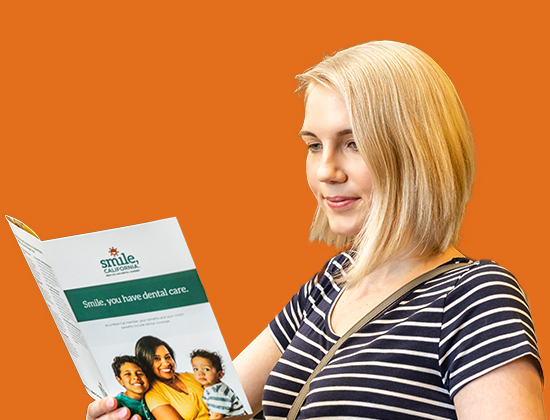Your dentist is your biggest ally when it comes to good oral health. Regular dental visits keep your gums and teeth strong and give your dentist a chance to learn about your overall health.

As a caregiver, you play an important role in helping your loved one maintain a healthy smile.
When your loved one is struggling with other health problems, their oral health can become a lower priority, but good daily oral hygiene and regular dental visits help your loved one avoid tooth pain and tooth loss. Practicing good daily oral hygiene is an important part of maintaining a healthy smile and good overall health, but your loved one may not be able to brush and floss by themselves and might need your help. As a caregiver, you play an important role in helping your loved one keep their teeth and gums healthy. Here are some tips for helping your loved one maintain a healthy smile:
- Set a routine – It is important for everyone to brush two times and floss at least one time every day. Help or encourage your loved one to make these important steps part of their daily routine.
- Schedule dental appointments – It is important for your loved one to visit the dentist each year for a cleaning and check-up. Regular visits allow their dentist to check for and even prevent oral health problems. Talk with your loved one about the importance of visiting the dentist and offer to help schedule their dental appointment.
- Eat well – Good nutrition plays an important role in keeping teeth and gums healthy. Encourage them to replace sugary drinks and snacks with healthy options, like fruit and water. A healthy diet combined with good oral hygiene is the best defense against cavities.
- If your loved one has dentures – Partial or full dentures should be removed and cleaned every morning and night with denture cleaner. Dentures should be soaked in water overnight. Remind or help them to rinse their dentures after meals. When dentures are out, remind or help them brush their gums and the roof of their mouth with a soft-bristled toothbrush.

If your loved one can brush and floss on their own:
- Talk with your loved one about the importance of keeping their mouth healthy.
- Ask about their daily oral care routine and help them set a schedule to brush two times and floss one time every day. Encourage your loved one to use a timer to help them brush for at least two minutes.
- Check that they have an easy-to-handle toothbrush without frayed bristles. Choosing a toothbrush with a large handle or extra grip padding can make brushing more comfortable. Be sure they are replacing their toothbrush every three months.
- Help them choose dental floss or floss picks they can use easily.
- Offer to make dental appointments for your loved one and drive them to their appointments. Help them follow any advice their dentist gives.
If your loved one needs help taking care of their mouth:
- Use the “tell-show-do” technique – When brushing and flossing your loved one’s teeth explain (tell) what each step is before you start. Show your loved one how you are going to brush and floss their teeth. For example, hold the toothbrush and show them how you brush your teeth. You can also put your hand over their hand and gently guide the toothbrush. Do each step exactly how you explain it so there are no surprises.
- You don’t have to brush and floss at the bathroom sink – setup where your loved one and you will be most comfortable.
- It’s important to brush twice each day, but it doesn’t have to be first thing in the morning and last thing before bed. Instead, find times when you are both calm and have time for the task.
Additional Resources for Caregivers
